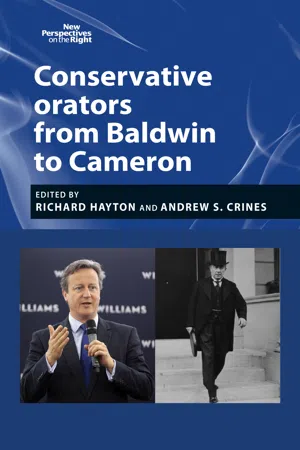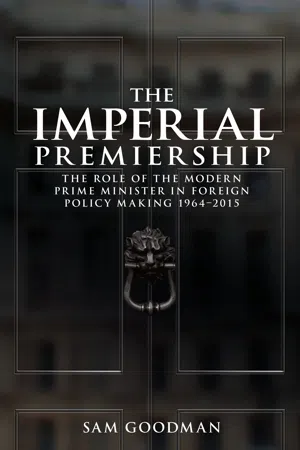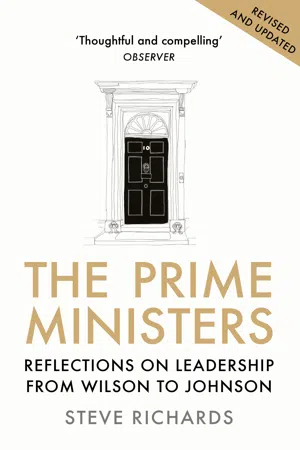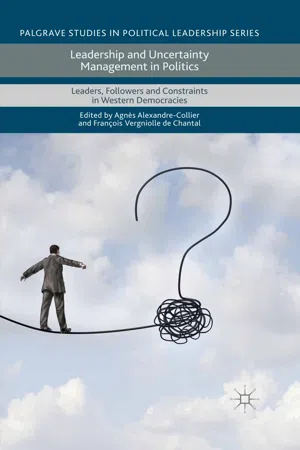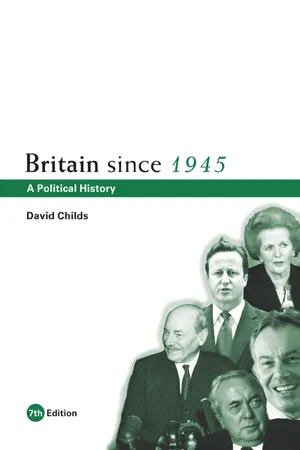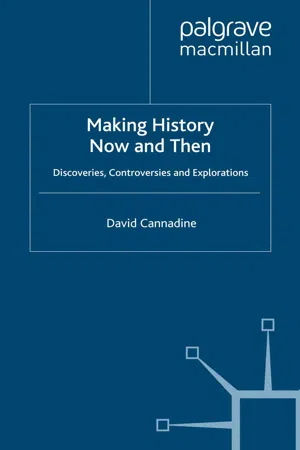History
Sir John Major
Sir John Major was a British politician who served as the Prime Minister of the United Kingdom from 1990 to 1997. He was a member of the Conservative Party and played a key role in negotiating the Maastricht Treaty, which led to the creation of the European Union. Major's premiership was marked by economic challenges and political controversies, including divisions within his own party.
Written by Perlego with AI-assistance
Related key terms
1 of 5
7 Key excerpts on "Sir John Major"
- eBook - ePub
Conservative orators
From Baldwin to Cameron
- Hayton Richard, Andrew S. Crines, Hayton Richard, Andrew S. Crines(Authors)
- 2015(Publication Date)
- Manchester University Press(Publisher)
9The oratory of John MajorTimothy Heppell , and Thomas McMeekingJohn Major served as prime minister between November 1990 and May 1997. For a Conservative his journey to Downing Street was unconventional. After leaving school with limited qualifications he experienced unemployment in his youth, before working for the Standard Chartered Bank, joining the Young Conservatives and being elected as a member of Lambeth London Borough Council (1968–71). He would enter Parliament at the age of thirty-six in 1979. Of his fellow entrants from that year he was the first to reach Cabinet in 1987, having worked in the Whips’ Office (1983–85) and within the junior ministerial ranks of the Department of Health and Social Security (1985–87). After two years as Chief Secretary to the Treasury (1987–89), he was briefly (and surprisingly) Foreign Secretary in 1989 (May to October) before being appointed Chancellor of the Exchequer in October 1989. He was then dramatically elected as leader of the Conservative Party in November after the removal of Margaret Thatcher.However, despite the human interest of his humble beginnings and the length of his prime ministerial tenure, he has been overshadowed by his predecessor, Thatcher, and his successor, Tony Blair. Both of them were able to win three successive general elections and govern for over a decade. Both of them challenged traditional assumptions about their parties through Thatcherism and New Labour. Without their electoral records, or a narrative or governing approach to associate with his name, Major has seemed inconsequential by comparison.Although Major did win the general election of April 1992, a perception developed thereafter that he was an ineffective prime minister. It stemmed from the following factors. First, his reputation for competence was fatally undermined by the humiliating ejection from the Exchange Rate Mechanism (ERM) in September 1992. Second, a series of sexual and financial scandals engulfed the Conservatives, reinforcing doubts about their integrity and commitment to public service. Finally, the Parliamentary Conservative Party (PCP) lost its reputation for internal discipline and unity. Major seemed powerless as the party went into convulsions tactically over the ratification of the Maastricht Treaty and strategically over the single European currency. The cumulative effect of these factors was that the Conservatives under Major no longer possessed the characteristics of a party of government (Norton, 1998 - eBook - ePub
The imperial premiership
The role of the modern Prime Minister in foreign policy making, 1964–2015
- Sam Goodman(Author)
- 2016(Publication Date)
- Manchester University Press(Publisher)
6John Major, 1990–97
The sudden and unexpected demise of Margaret Thatcher's premiership created the conditions under which for the first time since Churchill, a Prime Minister ascended to the office in the middle of preparations for war. On the day John Major entered No. 10 on 28 November 1990, there were 29,000 British troops stationed in Saudi Arabia. Faced with a foreign policy baptism of fire, Major had to weigh up both domestic political concerns and international concerns coming from Britain's allies.The Prime Minister's main focus was on uniting a deeply divided Conservative Party that had just removed one of their most popular leaders. As her successor, his position was less stable. He was more reliant on figures in the Cabinet with their own bases of power within the party. With this in mind, he chose to keep Thatcher's Cabinet intact, only firing two junior ministers from their positions.1 Lord Michael Heseltine, Deputy Prime Minister under Major believes he wanted a break from the past: ‘John wanted to avoid any repetition of the tensions of the Thatcher years; he was himself a much more consensual character’.2Preparations for the Gulf War were in their final stages and members of the European Community were in the middle of negotiations for a new treaty to create a common currency. These two pressing foreign policy challenges meant that Douglas Hurd as Foreign Secretary and a rival in the leadership challenge to succeed Margaret Thatcher would be indispensable. Major knew from the outset that he would need him. Hurd had significant influence over Major, as Sir Stephen Wall, Major's Private Secretary at the time recalls: ‘Hurd had huge authority, having been in the Foreign Office before. He had been a senior minister before Major, was the Secretary of State for Northern Ireland and Home Secretary. That made their relationship much more equal’.3 - eBook - ePub
The Prime Ministers
Reflections on Leadership from Wilson to Johnson
- Steve Richards(Author)
- 2019(Publication Date)
- Atlantic Books(Publisher)
5
JOHN MAJOR
John Major became prime minister in November 1990 in arguably the most politically traumatic circumstances of any modern prime minister, with the exception of Theresa May. Jim Callaghan, another contender for this title, had faced an economic nightmare, but his transition to leadership was smooth. Major’s was far from smooth, even if it seemed so at the time.Major became prime minister after the act of regicide by Conservative MPs, when ministers and backbenchers contrived the sensational removal of Margaret Thatcher, the three-times election winner, against her will. It was an insurrectionary move that many MPs could hardly believe they had carried out.As part of the challenging context, Major was not well prepared. Like Theresa May, he was ambitious. He had wanted the top job, but had not expected a vacancy to appear so suddenly in the autumn of 1990, just as Theresa May had not anticipated it in the summer of 2016. No one knew that the act of regicide was going to happen until it did. A few weeks earlier the Conservative party conference had been singing ‘Happy Birthday’ to Thatcher, and she had responded with exuberant waves from the conference platform. Major was her chancellor at the time, having been a short-serving Foreign Secretary. He had held the two top jobs in the Cabinet, but only very briefly.Less experienced than the candidates he defeated in the 1990 leadership contest, Major faced some titanic challenges as a new prime minister. The Conservatives had been well behind in the opinion polls and had lost a by-election in the theoretically safe seat of Eastbourne a short time before his victory. This was one of the reasons why Tory MPs turned against Margaret Thatcher. They feared they would lose their seats. The government of which Major had been a part had introduced its flagship policy, the poll tax. Major also faced a negotiation with the rest of the European Union over the forthcoming Maastricht Treaty. Some of his MPs opposed Maastricht, as did Margaret Thatcher herself. And the economy was sluggish. - eBook - PDF
European Integration
Scope and Limits
- M. Holmes(Author)
- 2001(Publication Date)
- Palgrave Macmillan(Publisher)
15 Neil Marten, speaking on the Thames Television programme, ‘Europe the Great Debate’, 11/8/70. 3 John Major and Europe: The Failure of a Policy (1997)* Introduction As the Major era has now come to an end it is possible to con- sider his premiership in its entirety, to evaluate exactly what John Major’s European policy actually was. His term of office can be split into three distinct parts. Firstly, between November 1990 when he became Conservative party leader, and the Gen- eral Election in April 1992, Major pursued a policy of compromise in order to hold his party together because the question of Eu- rope threatened to split it apart. The second period was that of Euro-enthusiasm, between the victory in the April 1992 election and September 1993, which was characterised by Major’s enthu- siasm for the ERM and by the passage through the House of Commons of the Maastricht Treaty. In the third period, from September 1993 up to and including the 1997 General Election, Major reverted to the policy of compromise. During the com- promise Mark II the issue of Europe became a function of party management, as Major endeavoured to preserve a fragile semblance of party unity. Ultimately Major’s European policy contributed mightily to his election defeat. Compromise Mark I John Major became the Conservative party leader in 1990 be- cause he was the ideal compromise candidate; someone who could * Bruges Group publication (1997). 27 M. Holmes, European Integration © Martin Holmes 2001 28 Britain and European Integration unite the party; a healer not a warrior; a pragmatist not an ideo- logue; a person who would appeal to the Thatcherites but equally who would co-operate with the Heseltinies; a man who could rally the party with a General Election less than two years away. - eBook - ePub
Leadership and Uncertainty Management in Politics
Leaders, Followers and Constraints in Western Democracies
- François Vergniolle De Chantal, Agnès Alexandre-Collier(Authors)
- 2015(Publication Date)
- Palgrave Macmillan(Publisher)
As already stated, John Major’s accession to power was followed by a significant improvement of the relationships between the UK and the EC. However, it was more a change of style than a change of substance, as demonstrated by the opt-outs negotiated by Major at Maastricht – on the single currency but also on the social chapter. Yet, the ratification process of the Maastricht Treaty brought about deep divisions within the Conservative Party and put an end to John Major’s constructive approach to the European Union (EU) – not only in his discourse as discussed above, but also in his actions on the European stage. The British leader went from conciliation to confrontation, echoing his predecessor’s attitude. There are many examples of this: in March 1994, he opposed the raising of the blocking minority required by the enlargement of the EU to new member-states. Major was adamant and decided to turn this into a test of strength, until eventually he was forced to retreat. He had taken political risks in order to reassert his leadership over his deeply divided party but the situation had backfired and he was left humiliated, vulnerable to leadership speculation once again. A few months later, in June 1994, the British Prime Minister opposed his veto to the election of Jean-Luc Dehaene at the head of the European Commission, not only to protest against the ‘French–German diktat’ (Major, 1999: 594) but also because the candidate was too federalist for the British government. Lastly, in 1996, during the BSE (‘mad cow disease’) crisis, the Major government opted for an obstruction policy, blocking all EU decisions requiring unanimity, in protest against the ban on British beef. In fact, despite John Major’s initial attempt to distance himself from his predecessor on the European issue, his premiership was characterised by continuity with the Thatcher years.The radical change in John Major’s approach to Europe was accompanied by an instrumentalisation of the European issue for partisan political purposes (Tournier-Sol, 2009: 85–99). Indeed, the eurosceptic turn taken by the Conservative leader aimed at rallying the very support of those in the party which the Maastricht ratification process had alienated. John Major thereby strove to contain the internal splits which were threatening to tear his party apart. Accordingly, he was blamed for subordinating the relationship between Britain and the EU to party management and for putting party unity before the national interest – he was a ‘Chief whip manqué ’ (Kavanagh and Seldon, 1994: 48), ‘a managerial leader and political tactician for whom holding the party together was virtually an end in itself’ (Dorey, 1999: xv). This is quite symptomatic of John Major’s political leadership: the Conservative leader acted as an agent of his followers in his own party for the sake of its – and his – own survival. Party cohesion was his utmost priority, with leadership a major factor.However, conflicts were not limited to the European stage and also arose within the party and government during the end of the Thatcher era and the whole of Major’s premiership. Those internal conflicts affected their respective leaderships to which they were also inextricably linked, albeit differently – thereby shedding an instructive light on the role of political leadership.The Maastricht ratification severely damaged the leadership of John Major, who had to face a rebellion in his party ranks. The Conservative majority in the House of Commons had been reduced to 21 after the 1992 general election, thereby making the Major government very vulnerable to the euro-rebels by giving them disproportionate influence during the ratification process (Baker et al., 1993; Alexandre-Collier, 2009). Although this episode undoubtedly undermined Major’s leadership, the success of the ratification can also be considered as a considerable achievement in itself given the internal rifts in the Conservative Party – an achievement which John Major can take full credit for and which rests on his tactical skills as a political leader (Bogdanor, 2010: 174–5). The ratification process showed the Conservative leader taking political risks, which were to have lasting consequences on his leadership. This episode was all the more decisive in his premiership that it was also the founding element of his European policy after that. - eBook - ePub
Britain since 1945
A Political History
- David Childs(Author)
- 2013(Publication Date)
- Routledge(Publisher)
11
IN MAJOR'S ‘CLASSLESS SOCIETY’,1990–96
JOHN MAJOR: ‘CABINET NO LONGER … CONFRONTATION’
When the victory of John Major (b. 1943) for the leadership of the Conservative Party was announced, Margaret Thatcher said she was ‘thrilled’. Alan Clark, reflected the view of many Conservative MPs when he wrote, John Major ‘being calm and sensible, is infinitely preferable to that dreadful charlatan, H. But John is virtually unknown. He's not at all flash, and a lot of colleagues think it's flash that we need at the moment. And he's not classy, which doesn't worry me in the slightest, but worse, he doesn't (like Mrs T.) even aspire to be classy.’1Major had reached the top job in British politics after just eleven years in Parliament and three years in the Cabinet. He was the youngest Prime Minister for nearly a century. Born in Merton, Surrey, the son of a circus performer, he was educated at Rutlish Grammar School in Wimbledon. He left school at 16, taking employment as a labourer and as a clerk before joining the Standard Chartered Bank in 1965. He worked for the bank in Nigeria and, later, as personal assistant to the former Chancellor, Anthony Barber. In 1970 he married Norma Johnson and they had a son and a daughter. After joining the Young Conservatives at 16 Major served on the Lambeth Borough Council. He was elected to the safe seat of Huntingdon in 1979. Major's first ministerial experience was at the Department of Social Security (1985–87). He served as Chief Secretary to the Treasury, 1987–89. After a brief spell as Foreign Secretary he was appointed Chancellor in 1989. In ideological terms he was broadly acceptable to all sections of his party. He was liberal on such issues as immigration and in his opposition to capital punishment. He was reckoned to be for ‘sound money’ in the Conservative tradition but he called for a ‘classless society’. Finally, he was much more positive about the European Community than Thatcher had been. - eBook - PDF
Making History Now and Then
Discoveries, Controversies and Explorations
- D. Cannadine(Author)
- 2008(Publication Date)
- Palgrave Macmillan(Publisher)
7 Nation: British Politics, British History and British-ness 1 During the national campaign to elect British members to the European Parliament in Strasbourg, which was fought out in May 1994, the then Conservative Prime Minister, John Major, offered this version of the history of the country whose government he led: This British nation has a monarchy founded by the Kings of Wessex over eleven hundred years ago, a Parliament and universities formed over seven hundred years ago, a language with its roots in the mists of time, and the richest vocabulary in the world. This is no recent historical invention: it is the cherished creation of generations, and as we work to build a new and better Europe, we must never forget the traditions and inheritance of our past. 2 Albeit in less strident form, these rather idiosyncratic comments echoed those made by his predecessor, Margaret Thatcher, in Paris at the bicentennial of the French Revolution, when she spoke with more force than accuracy about Magna Carta, about the ‘quiet revolution’ of 1688, and about the ‘English tradition of liberty’ which ‘grew over the centuries’. 3 Taken together, their remarks suggest that when it comes to producing a contemporary account of our nation’s past, the most unreconstructed and uncompromising form of Whig history has been that preached from 10 Downing Street by Tory Prime Ministers. In more ways than one, it is a suggestive and significant irony. For their account was not only Whig history implausibly masquerading as Conservative propaganda: notwithstanding their ritual invocation of the word ‘Britain’, it was also emphatically ‘Little England’ history. Both Margaret Thatcher and John Major were asserting the essential Englishness 171 172 MAKING HISTORY NOW AND THEN of the United Kingdom, its separateness from the rest of Europe, the long and unbroken continuity of its traditions and precedents, and its unique characteristics and institutions.
Index pages curate the most relevant extracts from our library of academic textbooks. They’ve been created using an in-house natural language model (NLM), each adding context and meaning to key research topics.
